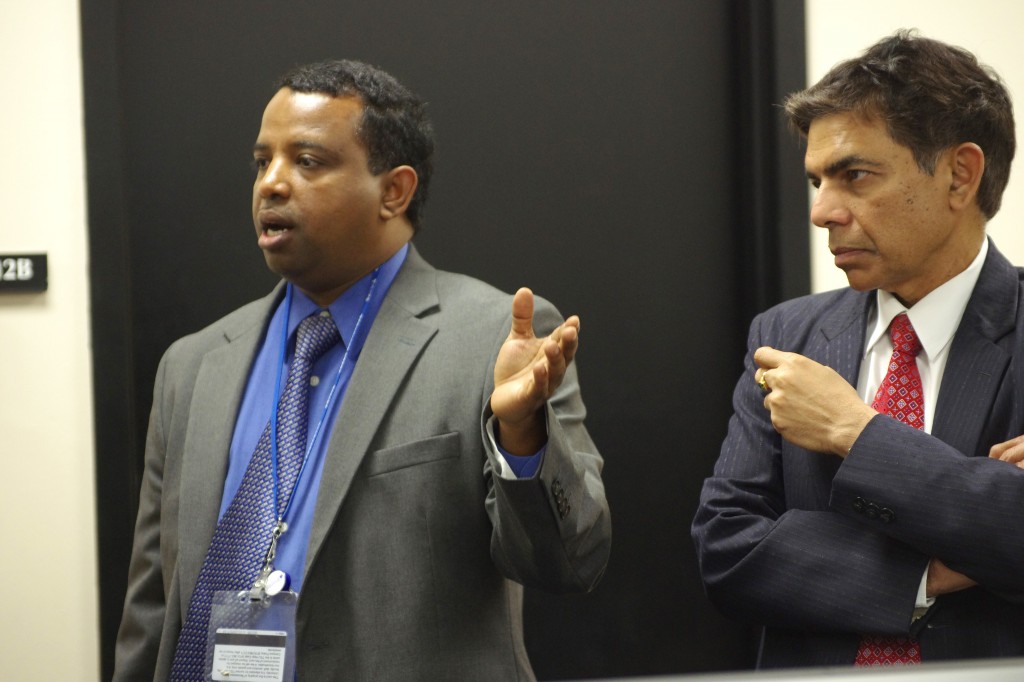
NASHVILLE, Tenn. (TSU News Service) – A new online degree concentration intended for professionals and students, who wish to advance their careers but do not plan to seek additional education at the doctoral level, will kick off at Tennessee State University next fall.
The Professional Science Master’s with a concentration in Applied Geospatial Information Sciences, which provides broad-based expertise and cutting-edge skills, combines the scientific and technical knowledge of an advance degree in GIS with business knowledge and experience, according to planners.
Designed for working professionals and full-time students, the program, which also allows participants to maintain a career while earning their degree, was necessitated by the need demonstrated by students in the current graduate certificate program, and the growing demand for well-trained professionals in the rapidly expanding GIS and Remote Sensing field.
The PSM is being coordinated between the College of Agriculture, Human and Natural Sciences; the College of Business; and the College of Public Service and Urban Affairs. Already hired professors in the three colleges will teach courses in the program.
At a ceremony Monday to launch the PSM degree program in the College of Agriculture, Human and Natural Sciences, officials cited a U.S. Department of Labor Employment and Training and Administration report that shows that an additional 150,000 positions requiring geospatial-based skills will be created by the year 2020.
“This program is a marriage between science, business and technology, which makes it a highly sought-after area for opportunities in many disciplines and areas of industry,” said Dr. Chandra Reddy, dean of CAHNS. “People completing this program are highly skilled in modern technology and are equipped to analyze data, answer questions and solve problems in a cutting-edge scientific environment.”
According to Dr. Solomon Haile, assistant professor of Forestry and Applied GIS and coordinator of the PSM, the program is beneficial to many professional areas including natural resources managers, environmental engineers, architects, city planners, public health officials, and urban and regional planners.
“A transition in the availability and acceptance of the use of geospatial technology has created an accelerated demand for experts in this field in both the public and private sectors,” Haile said.
He added that the program, which is further strengthened by an advisory board of actively engaged employers from industry, business, government and non-profits, will “contribute to the University’s mission by producing graduates with advanced training in the cutting-edge interfaces of science and management.” Board members, he said, provide advice to the faculty on curriculum, assist with internships and placement, as well as help to identify projects.
“PSM offers students training in science and the opportunity to develop workplace skills highly valued by employers,” Haile said.
The PSM, a “non-thesis” program, offers courses entirely online, and an internship with real-world experience. It requires the completion of 36 semester credit hours, and at least 300 internship hours under the supervision of an applied GIS practitioner, Haile said. Participants in the program must maintain no less than a 2.75 GPA. Like any graduate program, applicants must have a first degree at the baccalaureate level and a grade point average of 2.75 on a 4.00-point scale is required for admission. Applications must be processed through the College of Graduate Studies and Research.
Department of Media Relations
Tennessee State University
3500 John Merritt Boulevard
Nashville, Tennessee 37209
615.963.5331
About Tennessee State University
With nearly 9,000 students, Tennessee State University is Nashville’s only public university, and is a comprehensive, urban, co-educational, land-grant university offering 38 undergraduate, 22 graduate and seven doctoral programs. TSU has earned a top 20 ranking for Historically Black Colleges and Universities according to U.S. News and World Report, and rated as one of the top universities in the country by Washington Monthly for social mobility, research and community service. Founded in 1912, Tennessee State University celebrated 100 years in Nashville during 2012. Visit the University online at tnstate.edu.